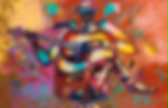

Keb Mo Am I Wrong HD. Keb Mo amp - Corey Harris - Sweet Home Chicago. Susan Tedeschi - Just Won't Burn. Junior Wells - Hoodoo Man Blues.wmv. Ali Farka Toure - Timbarma.wmv. Memphis Slim - Every Day I Have The Blues. Bo Diddley LIVE 1973 - "Hey, Bo Diddley" James Cotton "Midnight Creeper"
Blues Rock. Son House. Howlin' Wolf. Muddy Waters. Country Blues. Robert Johnson. Texas Blues. Boogie-woogie. Boogie-woogie is an African American style of piano-based blues that became popular in the late 1930s and early '40s, but originated much earlier, and was extended from piano, to three pianos at once, guitar, big band, and country and western music, and even gospel.
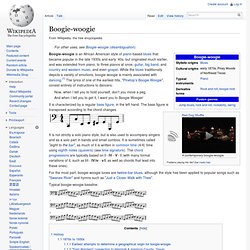
While the blues traditionally depicts a variety of emotions, boogie-woogie is mainly associated with dancing.[1] The lyrics of one of the earliest hits, "Pinetop's Boogie Woogie", consist entirely of instructions to dancers: Now, when I tell you to hold yourself, don't you move a peg. And when I tell you to get it, I want you to Boogie Woogie! It is characterized by a regular bass figure, in the left hand.
Roosevelt Sykes The Honeydripper. Good Rockin' Tonight by Wynonie Harris (1948) Woman I Ain't Gonna Drink No More Whiskey. What's the Use of Getting Sober. Boogie Woogie - Glenn Miller & Tommy Dorsey. Rosco Gordon-No More Doggin (high Quality) The Honeydripper by Joe Liggins (1945) Pinetop Perkins - Got My Mojo Working. Little Junior Parker / Driving Wheel. Lowell Fulson - Reconsider Baby. Delta blues. The Delta blues is one of the earliest styles of blues music.
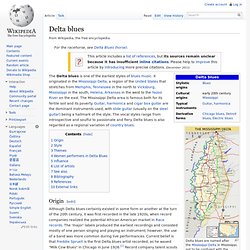
It originated in the Mississippi Delta, a region of the United States that stretches from Memphis, Tennessee in the north to Vicksburg, Mississippi in the south, Helena, Arkansas in the west to the Yazoo River on the east. The Mississippi Delta area is famous both for its fertile soil and its poverty. Guitar, harmonica and cigar box guitar are the dominant instruments used, with slide guitar (usually on the steel guitar) being a hallmark of the style. The vocal styles range from introspective and soulful to passionate and fiery. Skip James - Devil Got My Woman. 'Jesus Is A Mighty Good Leader' SKIP JAMES, Delta Blues Guitar.
Skip James- Hard Time Killin' Floor Blues. Bukka White - Shake 'Em On Down. Bukka White - Fixin To Die Blues. Jimmy Reed - Big Boss Man. Buddy Guy - First Time I Met The Blues. Joe Hill Louis - Boogie In The Park. Tommy Johnson - Canned Heat Blues (1928) T-Bone Walker-stormy monday. Robert Petway - Catfish Blues (1941) Bonnie raitt- Round & round. Jump blues. Origins[edit] Louis Jordan in 1946 Jump evolved from big bands such as those of Lionel Hampton and Lucky Millinder.
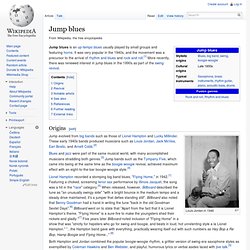
These early 1940s bands produced musicians such as Louis Jordan, Jack McVea, Earl Bostic, and Arnett Cobb.[2] Blues and jazz were part of the same musical world, with many accomplished musicians straddling both genres.[3] Jump bands such as the Tympany Five, which came into being at the same time as the boogie-woogie revival, achieved maximum effect with an eight-to-the-bar boogie-woogie style.[4] Both Hampton and Jordan combined the popular boogie-woogie rhythm, a grittier version of swing-era saxophone styles as exemplified by Coleman Hawkins and Ben Webster, and playful, humorous lyrics or verbal asides laced with jive talk.[5] As this urban, jazz-based music became more popular, both bluesmen and jazz musicians who wanted to "play for the people" began favoring a heavy, insistent beat. Revival[edit] Notable artists[edit] See also[edit] Louis Jordan & His Tympany Five. Big Mamou - The Mighty Blue Kings. Jimmy Witherspoon - Ain't Nobody's Business.
Frank Stokes - Downtown Blues. Lionel Hampton - Flying Home (1957) J.B. Lenoir - Eisenhower Blues. Big Joe Turner - Shake, Rattle & Roll. Further up the road - Bobby bland. Joe Williams - Goin To Chicago Blues. Taj Mahal - Corinna (1968) She Caught The Katy - Taj Mahal (Original Studio Recordings - 1968) Memphis Slim - Mother Earth. Fats Domino "Blue Monday" Hound Dog Taylor - Give Me Back My Wig (Live sound) Chicago blues. The two most significant cities for urban blues were Chicago and St.
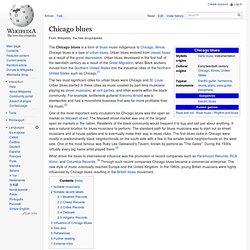
Louis. Urban blues started in these cities as music created by part-time musicians playing as street musicians, at rent parties, and other events within the black community. For example, bottleneck guitarist Kokomo Arnold was a steelworker and had a moonshine business that was far more profitable than his music.[2] One of the most important early incubators for Chicago blues was the open air market on Maxwell street.
The Maxwell street market was one of the largest open air markets in the nation. What drove the blues to international influence was the promotion of record companies such as Paramount Records, RCA Victor, and Columbia Records. [4] Through such record companies Chicago blues became a commercial enterprise. Notable musicians[edit] Guitarist Buddy Guy performing at the Bonnaroo Music Festival in 2006. Notable record labels[edit] Bluebird Records[edit] Chess Records[edit] Cobra Records[edit] James Cotton "Stormy Monday" Otis Rush-So Many Roads. Big Maceo Merriweather - Worried Life Blues. Derek and the Dominos - Have You Ever Loved a Woman.
Professor Longhair - In The Night. Bo Diddley - I Am A Man. Hey Bo Diddley-Bo Diddley. Bo Diddley ~ '' Do The Robot '' ( Blues Funk Soul , 1973 ) Beats & Style Lesson 4- The Bo Diddley Beat.
Otis Spann - T'Aint Nobody's Business If I Do. Little Walter - Key To The Highway. Little Walter My Babe. Electric blues. Electric blues is a type of blues music distinguished by the amplification of the guitar , bass guitar , drums , and often the harmonica .
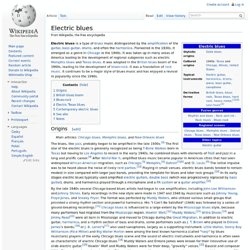
Pioneered in the 1930s, it emerged as a genre in Chicago in the 1940s. It was taken up in many areas of America leading to the development of regional subgenres such as electric Memphis blues and Texas blues . It was adopted in the British blues boom of the 1960s, leading to the development of blues-rock . It was a foundation of rock music . It continues to be a major style of blues music and has enjoyed a revival in popularity since the 1990s. Origins [ edit ] By the late 1940s several Chicago-based blues artists had begun to use amplification, including John Lee Williamson and Johnny Shines .
John Lee Hooker created his own blues style and renewed it several times during his long career. Memphis, with its flourishing acoustic blues scene based in Beale Street , also developed an electric blues sound during the early 1950s.
B.B. King - You Upset Me Baby (1956) "The Thrill Is Gone" BB King. Albert King - Blues Power. Sam Moore & Dave Prater - Soul Man. Luther alison. ZZ Hill Down home blues. John Mayall's Bluesbreakers. Blues Singer Matt Anderson. I'm On Fire - Matt Andersen. Matt Andersen.....So Gone Now. Robert Cray and Shemekia Copeland - I Pity The Fool - Bobby "Blue" Bland.
50 greatest traditional blues songs. “A lot of peoples wonder, ‘what is the blues?’ I hear a lot of people saying ‘the blues, the blues,’ but I’m gonna tell you what the blues is. When you ain’t got no money, you got the blues. When you ain’t got no money to pay your house rent, you still got the blues. A lot of peoples holler about ‘I don’t like no blues,’ but when you ain’t got no money, and can’t pay your house rent and can’t buy you no food, you damn sure got the blues.
If you ain’t got no money you got the blues, because you’re thinking evil. I’ve chosen not to include blues/rock fusion musion in this chart. Click on the artist’s name to see their Wikipedia entry, and on the song title to watch a youtube video of the song. UPDATE AUGUST 2010 : I’ve made a podcast aimed at fans of traditional blues. 50 James Baker and gang – Black Betty First, something that gives a sense of the roots of blues. 45 Casey Bill Weldon (1909 – 196?) 36 Jimmy Reed (1925 – 1976) – Little Rain Slow paced guitar and harmonica song.